- Home
- Adam Thorpe
Ulverton Page 6
Ulverton Read online
Page 6
The aftermass of clover I mowed October last, being kept suitably dry, we thrashed this day, it being clear and warm in the sun, though still middest March, and, after beating the husks again that were separated from the straw, got a goodly seed, fat and rounded, and five bushels of it from the first acre. That field being of seven acres, the whole should be thrashed before the week is out. I flailed for three hours, which eased my thoughts, and gave me much satisfaction.
My wife, it appears, suffers from nothing more than fear, or trepidation. It is plain to me that her last bearing, where she screamed for more than twenty hours, and lost much blood, and the child too, rendered her an invalid in the mind, if not the body: this being the reason she will not have me so much as stroke a hair upon her head. The stick she uses against me at my request, when I am driven to desire for procreation, is now guardian of this aforesaid fear. She is a weak vessel, then, and God has granted me a stronger. This day, being late March, and my seeds-man out in the field already, I am driven to these wild thoughts, that both please and distress me.
This day the cattle have been turned out.
In the dairy, this afternoon, with the door closed, I sought to seed my heir, against a full churn, her hands still ripe with butter, as a ram tups a ewe, but praying all the while I cast. Lord forgive me. A little rain this first week of April. I do not think anyone heard, although the girl’s cries (of pleasure) were hard to silence. We tipped over the churn, and lost, I reckon, a half of our butter.
The nails in the sideboards of the dung-waggon having loosened, and some lost, through the hard motion of the cart on the frozen ruts and also on the declivities of the road likewise stony with frost, I have taken up the advice of Mr Nash and thonged with leather, well greased, the sideboards to the raths and found these to be fast after a week of use. The dung spread in January has not, owing to the dry weather, and only a little rain the first week of April, done much goodness to the soil, by my reckoning, which is owing to the generally dry nature of white land that is not easily taken to drinking up the dung’s juices.
My seeds-man is advanced in years, and I have noted, that having a weakness of the wrist owing to his years, he is apt to back-drop much of the seed, which as he advances is plain to see, and will lead to a thicker run of corn where he broadcasts, and a thinner elsewhere. This seeds-man, having been my labourer at this season for twenty years, must soon be replaced, if an even spread of corn is to be realised henceforward. My cousin at Effley has pointed out the advantages of a seeds-man pacing against the incline of a field, if the field be so out of level, that uphill and downhill he must take short steps, whereas on the level his steps are apt to be lengthened, and so, broadcasting at every step, the seed be spread too thin. Also, if the seeds-man get tired, as he is apt to going up and downhill, his steps will thereby be shorter. The danger, as I did then remark, with both of us watching my seeds-man who did once or twice stumble, and did cover his beard in soil, is that of casting too thick, as with a weak wrist. My cousin agreed, and, doffing his hat that he did then use as a seed-lip, demonstrated to me the correct measurement of the stride, which he had arrived at after much observation on the commons at sowing-time, where are to be seen many seeds-men at once.
On Mr Tull’s seed-drill: this last ten years has seen a score of attempts at the introduction of this invention, which by all accounts is far superior to any seeds-man, and might, it is said, sow three tons of seed at one session. However, the former seedsmen and their companions in labour have withdrawn their labours completely at each attempt, and so simple fear of Improvement, which might increase general profit and feed our nation the better, which in time of war is seen to be more necessary, has miscarried this robust child of science, and so we must suffer weak wrists and wheezing old men.
This day, again, within the cow-house, up amongst the hay, when all the men were harrowing, and the cows at pasture on the leas, the grass being fat enough, I did apply my member to the use it is best made for, which is the making of an heir. The maid did keep her silence, and afterwards spent much time taking hay from her hair, which she wears still loose, and plucking off my shoulders lengths of the hair which had attached themselves to my coat, and which my wife, who is at market, might be made ill-thinking by. I note that upon her left dug, that is the maid’s, a small indentation is to be seen which, when questioned after, she did relate how she was bitten thereupon by a mongrel, who are a curse through the winter months, and most particularly to shepherds. The cow-house tallet, being generally dark at the rear, and we obscured by hay, has several parts in its wall where the sun alights through holes and cracks, and one of these illuminated us quite suddenly and made her cry out when the sun did come and go, as it did, this being a windy April. It was by this light that I examined her more particularly, and spied the bite-mark. It is remarkable how the hay has sufficed overmuch for the winter, much still lying about in heaps, and we deep within it, and the cattle already out to grass. This is owing to the richness of hay from clover, one acre equivalent to six acres of other, wilder, sourer grass, and it being our practice to feed only the oxen with hay beyond January, fearing a harsh winter. I explained as much to the girl, when she had let herself down into the foddering barton, and was picking her way through the dung therein, there being no one about in the yard at that hour, but such husbandry matters do ill please her.
I have thought, this night, before the fire, after a day of harrowing, and casting clover-seed upon the tinings that it might grow with the barley-seed already cast, how God approves, in his Majesty, the lowliest act of procreation, whether in the starky, stiff soil of husbandry or the moistness of woman. Because all coupling is in His image, if it be to belly, and further improve Creation by begetting, and not after lust only, or for craving of it. If my seed chitts within her, and within the soil of my land, then there is merely profit, and no waste. My wife did spin all day, but is now abed. I did read before the hearth but nodded off for a half-hour and bent the page on Leviticus.
I note, on my top field, the slow progress of the harrow, this being the brashy field, with a multiplicity of small stones that rest the tines. My labourer was of the mind to remove them before the next year, which would bear little profit for me owing to the requirement of much labour to achieve a clean field. I answered, that the stones, being on white land, and that land being dry and light, make an additional weight much needed by the soil. My man grunted only, which is always the response of the simple-minded. Still no rain.
Mr Philip Swiffen, of Speen, whose land abuts on the old castle at Donnington, and who I have been visiting this day to enquire after malt-dust, and to view his winnowing machine, which is the first to be acquired in these parts, and which unnecessitates a reliance on wind, its sacking sails providing a goodly breeze which blew my hat off, showed me a field which was the place of the battle between King and Roundhead, and he boasted that it yielded wheat whose ears numbered a regular five to seven, and some at fourteen! This, he explained, was owing, most like, to the blood spilt on that land, whose juices were thereby more nutritious. I have heard this before, but not at first-hand.
My dreams are at present troubled: of dogs, and paps, and my wife’s face under the harrow, which comes of the accident up at Farmer Garrard’s, where a man was drawn under the tines when the horse (for he uses no oxen) took fright at a boy’s bird-clapper being sudden operated. A dose of brandy aids my sleep each night. My wife watches me.
My bile being bad I took white lily. Two sheep slinked their lambs in one night this week, and that is the last, though we have four pur-lambs, who will make fine tupps. There was a rime on the thatch today, and my breath never went from the air. The maid’s warmth was welcome.
I note that, in my field that was sown to St Foin a year past, and on which I suffered the cows to go after the oats were cut, the grass is much injured by their feet and the cropping of their mouths, and is still not recovered, this being due, no doubt, to its youth and the dryness of these latte
r months. I will hayn it up from the cattle for the remainder of the year, lest further injury be suffered by the young shoots.
My maid is not well.
The manure passage in the cow-house was deepened this day.
The clover between the barley is already a good sward. I applied pigeons’-dung after the seed, this being a cold and clay field, and the manure of my poultry. It has worked to pleasing effect. May 12th, and still no rain. Today was hotter than any before in my memory. The maid is creamy about the face. On enquiry, she pushed me off, and ran to the houses of office, where I heard her retch. She is undoubtedly bellied. I informed my wife that she (the maid) had eaten of pork poorly-salted. My wife considered it owing to the habit of steeping fish in the common well in the square. I was at a loss for an answer, for she said this strangely. She tends the herbs from six until half-past seven every morning, which I think excessive, but she will not hear of it. There is hardly time to bake, and our bread is too chock with bran, and heavy.
My wife enquired, this night, why the stick had not been put to recent use. I was at a loss for an answer at first, but took out my small Bible, that I carry always, and laid my hand upon it. A wind got up and I had to rise in the middest of the night with a lanthorn to shut fast a door into the barn that was banging with much distress to the cattle. I found the latch broken, and tied it up with rope, and was much tired by this exertion, and the wind, and the hour. The wind was warm, being a westerly, but the yard appeared rimed with the moon full out, and I retired swiftly.
Although my writing is not smooth, and my tongue thick, I wish one day to write a book of husbandry, as Mr Fitzherbert’s that wrote formerly, and Mr Worlidge’s that my uncle, though only a parson, had upon his shelf, and lent me. There is in this latter the likeness of a patent seed-drill, which I believe never to have been tried.
I did, it seems, overfeed my St Foin, according to Farmer Barr, which made it sweet and so the cattle cropped it too close. All our timber is now stored. I am fashioning new flails from the thorn, and two new forks from the hazel. My ploughman reckons on there being the need for a new mouldboard, the wood somewhat scuffed and dented, and on indicating this to Farmer Barr, the latter postulated a greater use of iron in the plough’s parts, which would enable a lengthier service, but the ploughman, who was with us, readying to plough the fallow for the wheat crop that day, maintained that an over-use of iron would be evil to the soil, whereas wood is of the soil and so is not pernicious. Why then, I asked, is it not evil to have the share and coulter of iron, when they and they only touch the soil deeply? He was at a loss to answer, but maintained simply that, the less iron the better. I asked why should the iron poison the soil. He said it was common knowledge. Ah, how common knowledge vitiates all attempts at individual Improvement of husbandry, and of the science of its betters!
I was much relieved today, May 17th, by a thunder-shower which the roots of the corn must be glad of. On riding into Ulverdon, afterwards, I noted how the earth that was cracked and white on the road was now brim with water, but not yet soft. The fields around exhaled an odour which was most pleasing. The commons were full of folk for the strips are abundant with pernicious weeds, but once pulled they will no doubt burn them, whereas if they were to cover them with dung, or soil, they will compress into a substance like butter, and cut easily for application on the fields the next year. I met Mr King in the square, and we entered the ale-house called the New Inn (although it is by no means new), and he told me there of rags that might be bought in London for 2s per hundred-weight, and chopped by widows and suchlike for circa 6d per hundred-weight, and so chopped to an inch square then scattered at the second ploughing, which cloth turning fusty underneath would procure nourishment for the seed at winter sowing. I was much taken by this, and he promised to provide me at a decent rate, whereupon I would try it upon the second earth in July. He would fetch me the cloth within the month. I have noted the mouldiness of cloth on vagrants, and on buried cast-offs within the yard or fields, but have never considered its use as a manure. We were much disturbed, in our discussion, by rowdy fellows one of whom slipped on the straw, where he had sent his spittle, and cracked his nose. The evil usage of the grain that is now ripening in my field is the Vice of the age, although in moderation essential to good health. The crop that my labourers sow and harvest is frequently too much within them, so that their breath continually smells of barley, as it were, and their minds fuddled by it. Mr King agreed, and stated that one seeds-man addicted to this tincture before us on the table witnessed the evidence of his sickness at harvest, when the field resembled a harlequin in the prints, all patches, and he vowed to Mr King never to touch a drop again, which is remarkable testimony to God’s working.
May 25th. When told of the maid’s state, and the necessity of saving a girl’s reputation, by adoption of the child, my wife took it ill.
This beginning of June, was the clover lea cut for hay. The weather being doubtful the second day, we enlarged the cocks and did not turn them, but left a hollow within to allow air to penetrate and dry. A steady rain for half a day did little damage therefore, and the weather is dry once more. As experiment, I left at least three cocks’-worth tedded over the field at nightfall, and on returning in the dewy morning found that the moisture had penetrated and expelled some of the juices, mixing with the sap, and so expelling also the smell of the grass, which in the cocks was exhaled much stronger: these having not been in contact, excepting their bases, with the nitrous properties of dew. I indicated this to the mowers and even the gatherers, but they seemed not to understand. The women and children laughed at my talk, indeed. One hay-rake broke upon a stone the last day, its brace having come loose, but not spotted in time. The grass having been mown at the time it began to knot, this crop should be exceeding rich, whereas if left longer, so that the stems are showing, it will be thinner and sourer. The crop has not suffered overmuch from the dry, although the barley amongst it is somewhat thin and brownish.
The maid has taken to a fuller skirt. She appears robust. I have put aside already the cost of her carrying, which she agreed at 7s, which is indeed a princely sum for a natural task, involving as it did her pleasure, which 1 have asked the Lord His forgiveness for.
June 20th: a hard rainfall, that left the barley ears dripping, and the thatch-runnel to go down my neck, and the corn to lose its thirst by, for it fell for two hours without cease.
I found this day, upon entering the hogs-yard, my wife seated amidst the peelings with a clout about her head, looking exceeding merry. My brandy bottle lay broken upon the ground, and I feared for the animals that their feet may be penetrated by the pieces of glass, and rendered maim. She allowed me to take her back into her bed, and I noted that she had clarted her hands and face with hogs’-dung, and washed her in silence, for I was angered by this display which was injurious to all our reputations, since it was seen by several of the servants gathered for their payment that evening, this being the close of the month, and no doubt chosen by her for that very reason. I have spoken to Dr Kemp, after the Meeting yesterday, who advises rest, and a medicament of some tincture with a Latin name that smells of camomile underfoot in autumn, but is not. My wife is going mad, owing, no doubt, to the confinement and its subsequent effects some time ago referred to. I prayed with her that God might meliorate her condition, and render her fit. Today was very hot. The sun has already undone the wetness of the recent rain, and the earth cracks and is friable underfoot. The odours of the aforesaid hogs’-dung are not displeasing, however, within these walls, as they turn my mind to Improvements.
The peas in the top field are somewhat thinnish. The new trees I planted thereabout to fend off the northerly winds have a blighted look owing to the lack of rain, but they have life in them yet, and should serve. My bird-boy bagged two ravens this morning with a sling-shot, and hung them out to smell off the others. On close inspection, the raven resembles Jewry, with its beak, that is larger than an ordinary crow’s, and its feat
hers, that are loose about the neck, like a Jew’s scarf in the illustrations. This same bird-boy, however, killed a rook last week, which no more resembles the ordinary crow than I resemble a common thief. He is no more than nine, but has an exceeding lack of teeth, which I put to his habit of chewing on sticks, which he does without cease from dawn to nightfall, as well as a certain tendency to brawls with his elders in the village. Despite the heat, he wears a coat of the thickest hide. I dwell upon this boy because he is the same age as my own would have been, had the good Lord seen fit to let him be so. How strange divine Justice appears to us mortals below, when one sees this boy hollering from his station by the oak on the headland, brought into this world only to scare off or slaughter scavengers such as himself, if of a lower order!

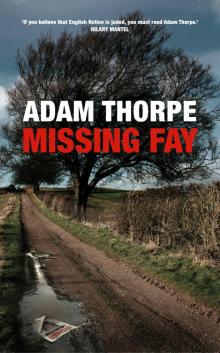 Missing Fay
Missing Fay Hodd
Hodd Pieces of Light
Pieces of Light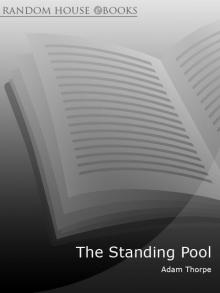 The Standing Pool
The Standing Pool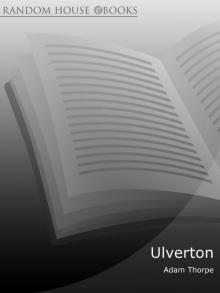 Ulverton
Ulverton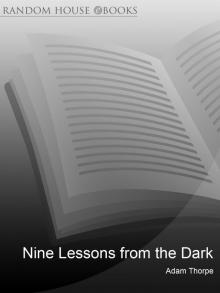 Nine Lessons From the Dark
Nine Lessons From the Dark Flight
Flight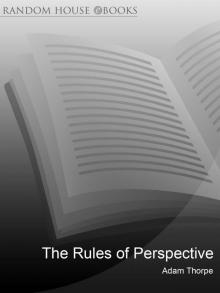 The Rules of Perspective
The Rules of Perspective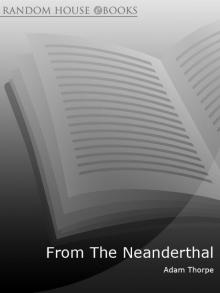 From the Neanderthal
From the Neanderthal Is This the Way You Said?
Is This the Way You Said?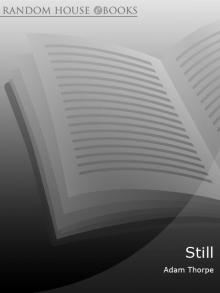 Still
Still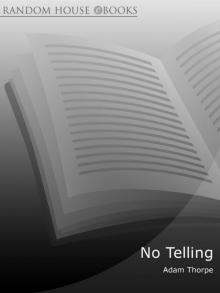 No Telling
No Telling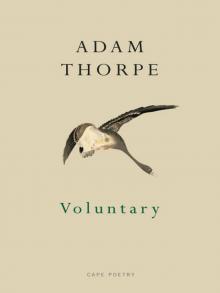 Voluntary
Voluntary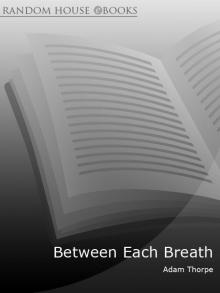 Between Each Breath
Between Each Breath